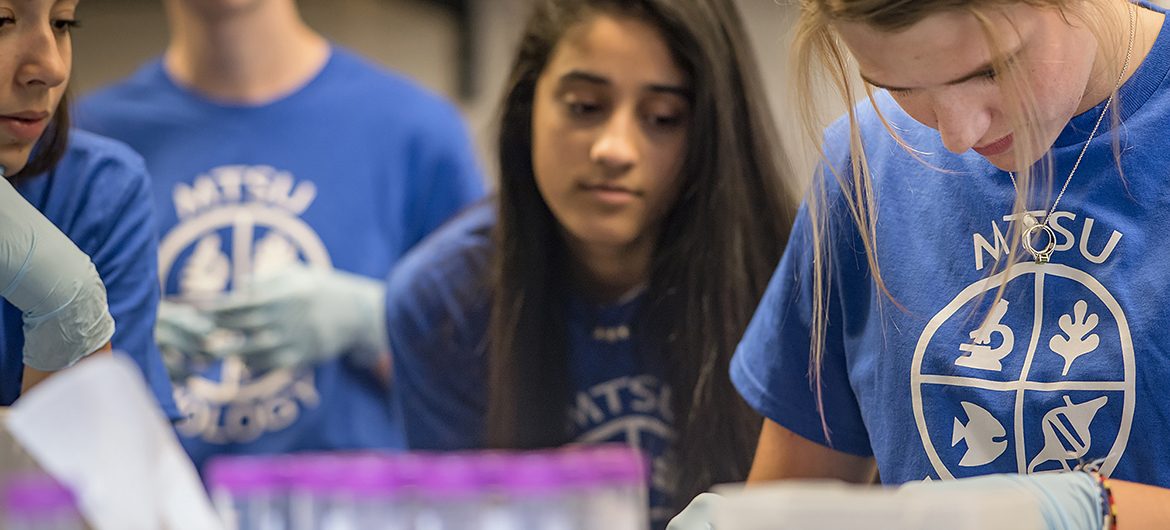Six of Blackman High School’s top science students are experiencing far-reaching insights into Middle Tennessee State University research and laboratory facilities during a weeklong immersion project.
Biology assistant professor David E. Nelson made the offering, which he calls “Art of Microscopy,” available to the students from Blackman Collegiate Academy and AP chemistry classes taught by Kimberly Baumann, who recently was named a state finalist for the Presidential Awards for Excellence in Mathematics and Science Teaching.

As Rija Asin, left, watches, William Logan looks into a laser microscope and Hassan Syed examines a microscopy image on the computer. (MTSU photos by Kimi Conro)
Nelson hopes to provide them with cutting-edge techniques used in the field of molecular cell biology and the biomedical sciences, giving them insight into what it might be like to not just study at MTSU but also be a scientist.
“It is really important to get a sense of how organisms operate at the level of individual cells and how these cells change over time,” he said. “One of the best tools to do that is live cell microscopy, where we use a variety of different fluorescent dyes to observe processes occurring in real time in living cells.”
The six students — five of whom are in the Blackman Collegiate Academy and its partnership with MTSU — include rising seniors Rija Asin, Kaeli Dorsey, Katie Hartman, William Logan, Sara O’Brien and Hassan Syed.

Assistant biology professor David E. Nelson, left, demonstrates a lab procedure to Kaeli Dorsey, one of six Blackman High School students attending a special one-week course involving individual cell research.
Nelson provided a 22-page booklet in advance, offering an introduction, schedule, full details of four research activities for the week and a campus map.
While they may have entered the MTSU Science Building in awe of the 250,000-square-foot facility and its labs and apprehensive because of the deep research, Nelson alleviated any nervousness with his low-key demeanor.
“At first it was overwhelming and scary, seeing and hearing all the terminology David used and all the advanced equipment,” Syed, 17, said. “We learned a lot about working in a lab and getting more experience with the equipment.”
Dorsey, 17, said it felt “weird going from a high school lab to this. … And the Science Building is really impressive.”
By Monday afternoon, they were actively working in the lab. Tuesday, afternoon, they transitioned to the fluorescence microscopes to “provide a good chance to interact with some of our most advanced research tools and, hopefully, generate some really nice fluorescence images of cells,” Nelson said.
Dorsey, who said Nelson has been great at explaining everything, saw cervical cancer cells through a microscope, adding she “didn’t learn how deep and complex cells were” until entering the MTSU lab.
“Cells give you a perspective of how real research is done on a more advanced way than a high school lab,” Syed said. “Now that the experience has started, I know there will be more to come the rest of the week. I have been waiting to come here for a while.”
While at MTSU, there will be opportunities for facility tours and that of the broader campus, and to meet other biology faculty, current undergraduate and graduate students and admissions staff.
Dorsey came on a Blackman Collegiate Academy visit to MTSU in March, touring the University Honors College and hearing about the world of concrete from Heather Brown, the director of the School of Concrete and Construction Management.
“I have been thinking about attending MTSU,” she said. “There is such a high standard for Honors College kids. And the things they do in the concrete building are amazing.”
Syed admits MTSU was not on his college choice radar. Now it is.
“Honestly, after I came here and he (Nelson) told me about the Science Building, now it is one of my options.”
To learn more about the various biology programs, visit http://www.mtsu.edu/programs/biology/.
— Randy Weiler (Randy.Weiler@mtsu.edu)

Blackman High School students perform research and view how individual cells change over time. Sara O’Brien, left, William Logan and Rija Asin wait while Katie Hartman works in the MTSU lab.


COMMENTS ARE OFF THIS POST